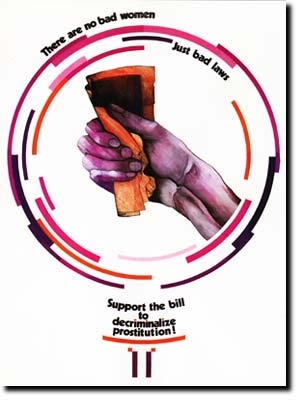
Sex Industry
The 19th Century
In 1829 Edward Gibbon Wakefield, while imprisoned in Newgate Prison for the abduction of 15 year old Ellen Turner to Gretna Green, wrote in 'A letter from Sydney', "the transportation of at least ten males for one female, maintains a great disproportion between the sexes. This is the greatest evil of all. ... Know then, that, in this British colony, open, naked, broadday, prostitution is as common as in Otaheite." [pg.108].
This moral argument for an equality of the sexes in the colonies informed the British government when drafting the 1834 'Act to empower His Majesty to erect South Australia into a British Province or Provinces, and to provide for the colonization and Government thereof.' The Act provided that "poor persons who shall by means of the said 'Emigration Fund' be conveyed to the said Province or Provinces shall, as far as possible, be adult persons of the two sexes in equal proportions".
Despite the best intentions of South Australia's founders there quickly developed in Adelaide's West End a visible sex industry, commonly referred to in the 19th Century as 'the social evil'. On 15 April 1843 The Register published a letter from one colonist, "Can you inform me how long the neighbourhood of Weymouth Street and Light Square are to be infested with brothels, and when the inhabitants are to be rid of the music, dancing, revelry and the mob of drunken blacklegs who idle about there all day and live on plunder and prostitution at night?" [The Register, Page 3c]
In response to this and similar statements of concern the Legislative Council passed 'An Ordinance for regulating the Police in South Australia', in 1844. Section XX stated, "every common prostitute wandering in the public streets or highways, or in any place of public resort, and behaving in a riotous or indecent manner ... shall be deemed an idle and disorderly person." The penalty was not more than one month in the House of Correction with hard labor. For a subsequent offence the offender was deemed a "rogue and a vagabond", the penalty being not more than three months with hard labor. This with some amendment was the structure of the law under which most women working as prostitutes were convicted in South Australia during the 19th Century.
Prostitution, particularly that occurring in Light Square and Hindley Street, continued to create much comment and outrage in the media for the remainder of the 19th Century. The letters provide an image of Light Square as "a number of pestiferous dens ... which maybe considered the moral cess-pools of the City of Adelaide." [Register 6 February 1850, 2e] One journalist described the conviction of prostitute Ellen Morgan, "a pert little nymph of the pave, was charged with being drunk the previous night. The prisoner, with a toss of her head, declared she really did not know anything of the matter. Constable Sullivan thought the fair one's statement extremely probable, as, when picked up from the pavement at Two O'clock that morning she was insensibly drunk." Ellen was fined 5 shillings. [Register 16 January 1850, 3e].
Fanny Oliver; date of discharge, 12 February 1868; offence larceny;
sentence, six calendar month's imprisonment; native place Middlesex
trade, prostitute; age, 19 years; height, 5ft.; complexion, fair; build,
middling; former residence, Adelaide; arrival in province, 1853; name
of ship and from whence, Lord of the Isles, London.
[South Australian Police Gazette 19 February 1868]
For the most part, a prostitutes run in with the law was not so entertaining. On 15 November 1874, Bridget Silver died in the city police cells. The inquest heard that Bridget was separated from her husband of ten years, Joseph Silver. Described as a known prostitute and habitual drunkard, Bridget had five children, two of whom had died aged 14 months and 17 months before she was arrested for larceny in April 1874. Joseph, her fifth child, died aged 8 months, while she was serving 2 months in prison. Following another charge of larceny in October 1874, Bridget was arrested in Hindley Street for being drunk on 14 November and unable to pay the 10 shilling fine was detained in the cells. The inquest into Bridget's death found she died "from heart disease and weakened brain, arising from the profligate life she had led." [Chronicle 21 November 1874, 13] Catherine, Bridget's youngest surviving child, died the following February, aged 5 years.
Prostitution in the new colony was considered by commentators at the time to have all sorts of causes, "Emigration Commissioners ... sending us the scum of the English and Irish workhouses", the desertion by men of their wives and children, the failure to provide women with adequate employment other than the sweat shops, and the men who paid for and supported the 'evil' but went "unpunished, while the victims of their lust are made to suffer." [Advertiser, 29 March 1875, page 2].
As early as 1856 the Anglican Church had opened a Female Refuge providing shelter and some employment for deserted wives, unmarried mothers and unemployed women, including reformed prostitutes. In 1867 the Adelaide City Mission, with a similar raison d'etre, was created; followed in 1868 by the Catholic Church refuge.
In 1863 the Act to consolidate and amend the laws relating to the Police of South Australia amended the penalties of the 1844 Ordinance and added a third tier to the offences of being idle and disorderly, and being a rogue and a vagabond. It provided that any person committing any offence which shall subject him to be dealt with as a rogue and a vagabond, such person having been previously convicted as a rogue and a vagabond shall be deemed an 'incorrigible rogue' and liable to imprisonment for any term not exceeding one year with hard labor.
It was in the Police Act of 1869 that Parliament passed with remarkably little debate a piece of legislation that would stay on the statutes well into the 20th Century. Section 49 of the Police Act 1869-70 stipulated,
"Any member of the Police Force, or any person whosoever, with or without a warrant may apprehend any reputed common prostitute ... or incorrigible rogues who, within view of such member of the Force or person apprehending, shall offend against this Act ... any constable who shall refuse or willfully neglect to take such offender into custody, or to take and convey him before a Justice of the Peace ... shall be deemed guilty of a neglect of duty ... "
Items 1 - 9 of 9












